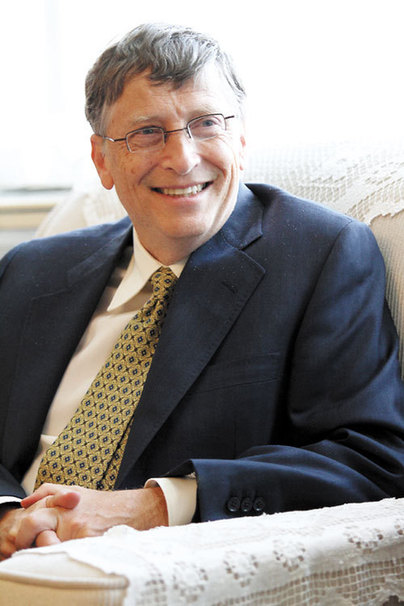Bill Gates envisions nuclear future for China
Updated: 2011-12-08 10:37
By Cheng Yingqi and Liu Yiyu (China Daily)
BEIJING / WASHINGTON - Billionaire philanthropist Bill Gates confirmed on Wednesday that a company he helped found is cooperating on the development of a new type of nuclear reactor in China.
"TerraPower is working on what we call Generation-4 nuclear energy. And the idea is to be very low-cost, very safe and generate very little waste," Gates said at a news conference after he discussed cooperation with Ministry of Science and Technology officials in Beijing on Wednesday.
"It is in an early stage," Gates said.
TerraPower, co-founded by Gates several years ago, is working on the idea of new technologies with the China National Nuclear Corporation (CNNC), though Gates said adoption of the technology will not happen quickly.
Under discussion is a traveling-wave reactor, or TWR, a new type of reactor that could reduce the need for the enrichment and reprocessing of uranium.
If successful, TWRs would be smaller, cleaner nuclear reactors that would create less nuclear waste and could be used for years without refueling.
Aware of the long-term risks of storing radioactive waste and of nuclear fuel being diverted to build weapons, scientists since the 1940s have tried to develop methods to recycle the waste by using it as fuel.
TWRs are believed to be a possible solution - but only conceptually - because they have not been built or tested successfully, according to Xu Mi, chief expert of CNNC.
Moreover, Gates said the development of the new reactor design may require investment of hundreds of millions of dollars in the coming years, and demonstration plans and construction would cost "billions".
He also promised the new designs would be "totally safe" in all circumstances, "including earthquakes".
Qian Jihui, professor of nuclear and new energy technology at Tsinghua University, said even though there are a lot of discussions about the new reactor, it is not expected to be available soon for commercial use.
"There is not a unified definition for a 4G reactor," Qian said. "In my opinion, it mainly refers to the absolute safety of the reactor, which will never cause any disaster or accidents during operation."
He said China is preparing to build the first demonstration projects of a 4G reactor with a capacity of 200,000 kilowatts.
However, he said it is too early to expect that the 4G reactor can be used in China since the country has not lifted the suspension of new nuclear power projects, a ban imposed after leaks from a Japanese nuclear plant in March.
The Ministry of Science and Technology said it is glad to join hands with Gates.
"When we cooperate with Gates, what we value so much is not Gates' money, but his social influence, his rallying power and his innovation ability," said Zhang Laiwu, vice-minister of science and technology.
 |
Bill Gates is co-chair of the Bill&Mellinda Gates Foundation.
|
"TerraPower is working on what we call Generation-4 nuclear energy. And the idea is to be very low-cost, very safe and generate very little waste," Gates said at a news conference after he discussed cooperation with Ministry of Science and Technology officials in Beijing on Wednesday.
"It is in an early stage," Gates said.
TerraPower, co-founded by Gates several years ago, is working on the idea of new technologies with the China National Nuclear Corporation (CNNC), though Gates said adoption of the technology will not happen quickly.
Under discussion is a traveling-wave reactor, or TWR, a new type of reactor that could reduce the need for the enrichment and reprocessing of uranium.
If successful, TWRs would be smaller, cleaner nuclear reactors that would create less nuclear waste and could be used for years without refueling.
Aware of the long-term risks of storing radioactive waste and of nuclear fuel being diverted to build weapons, scientists since the 1940s have tried to develop methods to recycle the waste by using it as fuel.
TWRs are believed to be a possible solution - but only conceptually - because they have not been built or tested successfully, according to Xu Mi, chief expert of CNNC.
Moreover, Gates said the development of the new reactor design may require investment of hundreds of millions of dollars in the coming years, and demonstration plans and construction would cost "billions".
He also promised the new designs would be "totally safe" in all circumstances, "including earthquakes".
Qian Jihui, professor of nuclear and new energy technology at Tsinghua University, said even though there are a lot of discussions about the new reactor, it is not expected to be available soon for commercial use.
"There is not a unified definition for a 4G reactor," Qian said. "In my opinion, it mainly refers to the absolute safety of the reactor, which will never cause any disaster or accidents during operation."
He said China is preparing to build the first demonstration projects of a 4G reactor with a capacity of 200,000 kilowatts.
However, he said it is too early to expect that the 4G reactor can be used in China since the country has not lifted the suspension of new nuclear power projects, a ban imposed after leaks from a Japanese nuclear plant in March.
The Ministry of Science and Technology said it is glad to join hands with Gates.
"When we cooperate with Gates, what we value so much is not Gates' money, but his social influence, his rallying power and his innovation ability," said Zhang Laiwu, vice-minister of science and technology.
No comments:
Post a Comment